
Ian Terence Botham, Baron Botham, is an English cricket commentator, member of the House of Lords and a former cricketer who has been chairman of Durham County Cricket Club since 2017. Hailed as one of the greatest all-rounders in the history of the game, Botham represented England in both Test and One-Day International cricket. He played most of his first-class cricket for Somerset, and also for Worcestershire, Durham and Queensland. He was an aggressive right-handed batsman and, as a right arm fast-medium bowler, was noted for his swing bowling. He generally fielded close to the wicket, predominantly in the slips. In Test cricket, Botham scored 14 centuries with a highest score of 208, and from 1986 to 1988, he held the world record for the most Test wickets until overtaken by fellow all-rounder Sir Richard Hadlee. He took five wickets in an innings 27 times and 10 wickets in a match four times. In 1980, he became the second player in Test history to complete the "match double" of scoring 100 runs and taking 10 wickets in the same match.
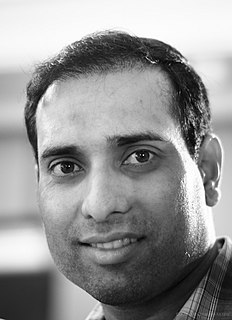
Vangipurapu Venkata Sai Laxman, known as VVS Laxman, is a former Indian international cricketer and a current cricket commentator and pundit. A right-hand batsman known for his elegant stroke play, Laxman played as a middle-order batsman in Test cricket.
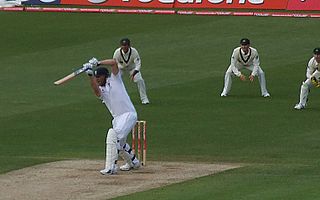
An all-rounder is a cricketer who regularly performs well at both batting and bowling. Although all bowlers must bat and quite a handful of batsmen do bowl occasionally, most players are skilled in only one of the two disciplines and are considered specialists. Some wicket-keepers have the skills of a specialist batsman and have been referred to as all-rounders, but the term wicket-keeper-batsman is more commonly applied to them, even if they are substitute wicket keepers who also bowl.
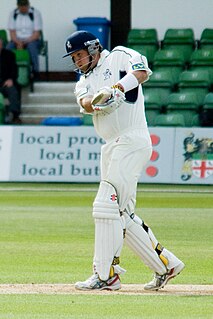
Robert William Trevor Key is an English former cricketer. He represented Kent County Cricket Club and is a former member of the England Test match and One Day International sides.

Grant William Flower is a Zimbabwean cricket coach and former cricketer.
The result in a game of cricket may be a "win" for one of the two teams playing, or a "tie". In the case of a limited overs game, the game can also end with "no result" if the game can't be finished on time, and in other forms of cricket, a "draw" may be possible. Which of these results applies, and how the result is expressed, is governed by Law 16 of the laws of cricket.

Andrew Ernest Stoddart was an English sportsman who played international cricket for England, and rugby union for England and the British Isles. He was a Wisden Cricketer of the Year in 1893.

Clement "Clem" Hill was an Australian cricketer who played 49 Test matches as a specialist batsman between 1896 and 1912. He captained the Australian team in ten Tests, winning five and losing five. A prolific run scorer, Hill scored 3,412 runs in Test cricket—a world record at the time of his retirement—at an average of 39.21 per innings, including seven centuries. In 1902, Hill was the first batsman to make 1,000 Test runs in a calendar year, a feat that would not be repeated for 45 years. His innings of 365 scored against New South Wales for South Australia in 1900–01 was a Sheffield Shield record for 27 years. The South Australian Cricket Association named a grandstand at the Adelaide Oval in his honour in 2003 and he was inducted into the Australian Cricket Hall of Fame in 2005.
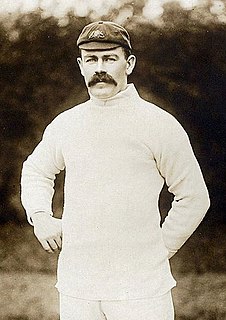
Joseph Darling was an Australian cricketer who played 34 Test matches as a specialist batsman between 1894 and 1905. As captain, he led Australia in a total of 21 Tests, winning seven and losing four. In Test cricket, he scored 1,657 runs at an average of 28.56 per innings, including three centuries. Darling toured England four times with the Australian team—in 1896, 1899, 1902 and 1905; the last three tours as captain. He was captain of the Australian cricket team in England in 1902, widely recognised as one of the best teams in Australian cricket history.

Edward Paynter was an English cricketer: an attacking batsman and excellent fielder. His Test batting average of 59.23 is the seventh highest of all time, and second only to Herbert Sutcliffe amongst Englishmen; against Australia alone Paynter averaged an extraordinary 84.42.
In cricket, the batting order is the sequence in which batters play through their team's innings, there always being two batters taking part at any one time. All eleven players in a team are required to bat if the innings is completed.
In cricket, a batsman is not out if they come out to bat in an innings and have not been dismissed by the end of an innings. The batter is also not out while their innings is still in progress.
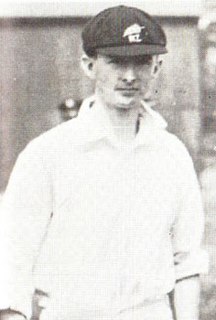
John Ernest Mills, known as Jackie Mills, was a New Zealand cricketer who played in seven Test matches between 1930 and 1933.
1948 was the 49th season of County Championship cricket in England. Don Bradman, who was shortly to retire, made his final appearance in England. Bradman's Australian team, which included Arthur Morris, a very young Neil Harvey, Ray Lindwall and Keith Miller, went through the tour without being beaten and became known to cricket's folklore as "The Invincibles". They won the Test series 4–0. Glamorgan won the County Championship for the first time under the dynamic captaincy of Wilf Wooller.

Murali Vijay is an Indian international cricketer who plays as a right-handed opening batsman. He was a regular member of the Indian Test team until 2018 after that due to great slump in his form he didn't feature in any Indian cricket squad, he also represents Tamil Nadu in first-class cricket.
Doug Ring was a member of Donald Bradman's famous Australian cricket team which toured England in 1948. Bradman's men went undefeated in their 34 matches; this unprecedented feat by a Test side touring England earned them the sobriquet The Invincibles.
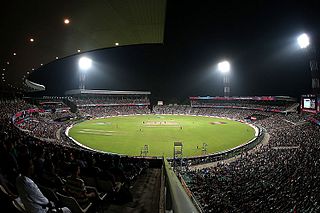
Cricket is a bat-and-ball game played between two teams of eleven players on a field at the centre of which is a 22-yard (20-metre) pitch with a wicket at each end, each comprising two bails balanced on three stumps. The batting side scores runs by striking the ball bowled at the wicket with the bat, while the bowling and fielding side tries to prevent this and dismiss each batter. Means of dismissal include being bowled, when the ball hits the stumps and dislodges the bails, and by the fielding side either catching the ball after it is hit by the bat and before it hits the ground, or hitting a wicket with the ball before a batter can cross the crease in front of the wicket. When ten batters have been dismissed, the innings ends and the teams swap roles. The game is adjudicated by two umpires, aided by a third umpire and match referee in international matches. They communicate with two off-field scorers who record the match's statistical information.

Benjamin Andrew Stokes is an English international cricketer and vice-captain of the England cricket team in Test cricket. Stokes was part of the England squad that won the 2019 Cricket World Cup, winning Man of the Match in the final. In July 2020, Stokes captained the England team for the first time, for the first Test match against the West Indies. Born in Christchurch, New Zealand, Stokes moved to northern England with his parents at the age of 12, where he learnt the game and began playing club cricket for local teams. A left-handed batsman and right-arm fast-medium swing bowler, Stokes has been the top-ranked Test all-rounder in the world since July 2020.
In cricket, a player's batting average is the total number of runs they have scored divided by the number of times they have been out, usually given to two decimal places. Since the number of runs a player scores and how often they get out are primarily measures of their own playing ability, and largely independent of their teammates, batting average is a good metric for an individual player's skill as a batter. The number is also simple to interpret intuitively. If all the batter's innings were completed, this is the average number of runs they score per innings. If they did not complete all their innings, this number is an estimate of the unknown average number of runs they score per innings.












